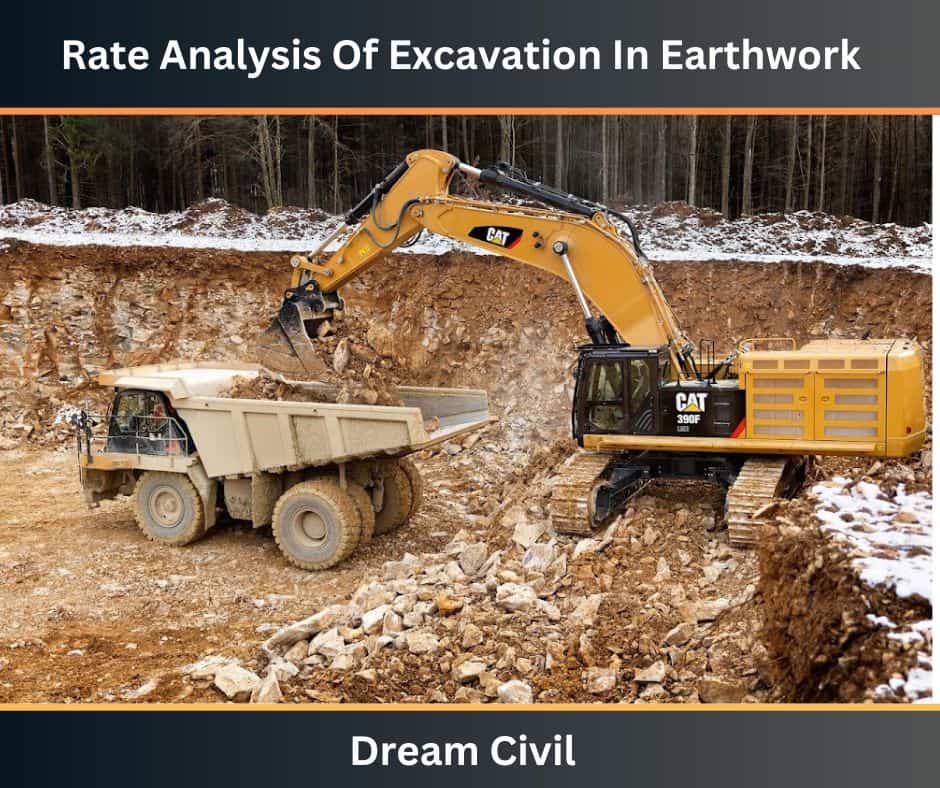Table of Contents
Rate analysis of excavation in earthwork is the measurement of the amount of excavation to be done, and the cost of equipment, machinery, and labor needed for similar work.
The cost of excavation relies on the depth of excavation, type of soil, method of excavation to be done, and the distance where the unearthed soil has to be collected.
The expense of all these is the sum of the unit volume of excavation to have the rate of excavation.
1. Rate Analysis of Excavation in Earthwork
The expense of excavation mainly relies on depth and is commonly divided into categories:
i. For depth upto 1.5 m
ii. For depth between 1.5m to 3 m.
iii. For depth between 3.m to 4.5 m.
iv. For depths more than 4.5 m
The depth of excavation needed differs from project to project and from place to place. Multiple factors impact the depth of excavation.
The rate analysis for excavation work can be categorized into the following methods:
The first method is choosing the type of soil to be unearthed and the lead distance where the soil has to be dumped.
Then the other variable that is evaluated is the depth of excavation which is proposed in the rate analysis report as follows:
1. Excavation in earthwork for soft soil for a distance of 1 km for the following depths are as follows:
a. Up to 1.5 m
b. 1.5 m to 3 m
c. 3 m to 4.5 m
2. Excavation in earthwork for hard soil/ hard rock for a lead distance of 1km for the following depths:
a) Up to 1.5 m
b) 1.5 m to 3 m
c) 3 m to 4.5 m
In the above examples of excavation, more descriptions are possible with different lead distances and types of soil.
During tendering of civil engineering projects, all the probable varieties are given for quotations depending on the project conditions and site requirements.

2. Rate Analysis of Excavation
The following topics are to be considered before beginning the rate analysis of soil that is as follows:
a. Type of soil
b. Lead distance and transport for carrying excavated soil
c. Depth of excavation
d. Method of excavation – manual excavation or mechanical excavation
e. The capacity of labor for manual excavation
f. The capacity of equipment for mechanical excavation and their cost per unit quantity.
g. Water charges if used
h. Profit of contractor
We will have an example related to the excavation of soft soil for a depth of up to 1.5 m and a lead distance of 50m per 10 m3 of concrete.
Rate Analysis Of Excavation In Earthwork is tabulated below:
| Items | Units | Qty. | Rate | Amount |
| Hydraulic Excavator | Day | 0.04125 | 5000 | 206.25 |
| Tractor/Dumper | Day | 0.04125 | 1500 | 61.88 |
| Unskilled Labor | Day | 1.20 | 311.2 | 373.44 |
| Total | 641.57 | |||
| Water charges @1% total | 6.42 | |||
| Contactor Profit @15% | 96.23 | |||
| SUM | 744.22 | |||
| Gross Amt./CUM up to 1.5m depth | COST | 74.42 |
In this example, the coefficient of the number of hydraulic excavators, tractor/dumpers, and unskilled laborers are depend on their ability per day i.e. 8 hours of work.
Let’s assume for 10m3, the hydraulic excavator is carrying 0.04125 days. Then its capacity assumed is ((1×10)/0.04125) = 242.4242 m3 / day.
That signifies, a hydraulic excavator can dig 242.4242 m3 of soil in one day. Its cost per day including driver and fuel is Rs. 5000.

Then the cost of 10m3 of excavation can be calculated as:
No. of days required for 10m3 excavation = 10/242.4242 = 0.04125 days.
The cost of a hydraulic excavator for 10m3 excavation = 0.04125 x 5000 = Rs. 206.25
Likewise, depending on the capacity of other equipment, labor, etc., their expense is estimated.
The contractor’s profit is also a sum of the total cost of labor and machinery. The grand total offers the rate of excavation per 10m3 of soil excavation.
Various mechanical equipment has various capacities per day for excavation work.
Their coefficient per m3 or per 10 m3 should be evaluated for calculation.
This was for the Rate Analysis Of Excavation In Earthwork.
3. References1. Content Filter & Authenticity Checking Team, Dream Civil International (Our team checks every content & detail to maintain quality.) |
Read Also: Rate Analysis For PCC

